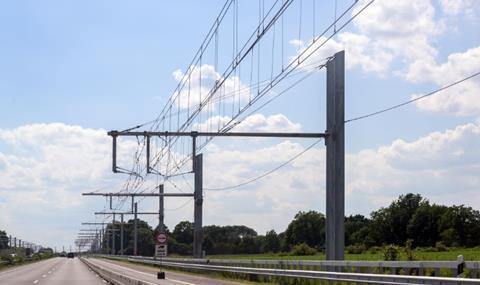
A £19.3bn plan to install overhead charging cables for electric lorries on the slow lanes of the UK’s motorways, which could help the UK meet its 200 zero carbon emissions target, has been published this week.
If the plans get government approval a £80m pilot programme could to be rolled out along 40 miles of the M180 between the A156 and the M18 in South Yorkshire.
The site has been earmarked because of its high levels of HGV traffic from Immingham port and its proximity to several national distribution logistics companies.
The government funded study, published by the Centre for Sustainable Road Freight, is calling for radical action to cut freight emissions which would see lorries driving on the inside lanes of motorways linked via a pantographs to overhead catenary cables, powered by the national electricity grid.
The electricity would charge the lorry’s electric motor and recharge an onboard electric battery that would power the trucks to their onward destinations beyond the electrified roads.
Read more
The DfT has already shown interest in this system. In March DfT officials were set to visit the test sites in Germany (pictured), but the trip was postponed because of the coronavirus pandemic.
The report calculates that whilst the eHGV vehicle would cost more than a diesel HGV, fleet operators would see an 18-month payback, since operating costs would be “considerably lower” due to improved vehicle efficiency and the low cost of electrical energy compared to diesel.
The paper estimates the system could be funded by private finance and built out across the UK’s busiest sections of motorway within two years at a cost of £5.6bn and would cover almost a third of the miles travelled by HGVs in the UK.
Later stages would bring the total cost to £19.3bn, with the roll out combined in parts with the Highways England Smart Motorway programme and the 5G programme to limit disruption to the motorway network.
The report’s authors say the pilot would use lessons learnt from extensive tests of e-highway electric road systems in Germany, Sweden and the US.
“This project will create a unique opportunity to decarbonise the UK’s logistics sector through private finance; to take a leading position in electric road systems across the country and throughout the EU,” the report concluded.














